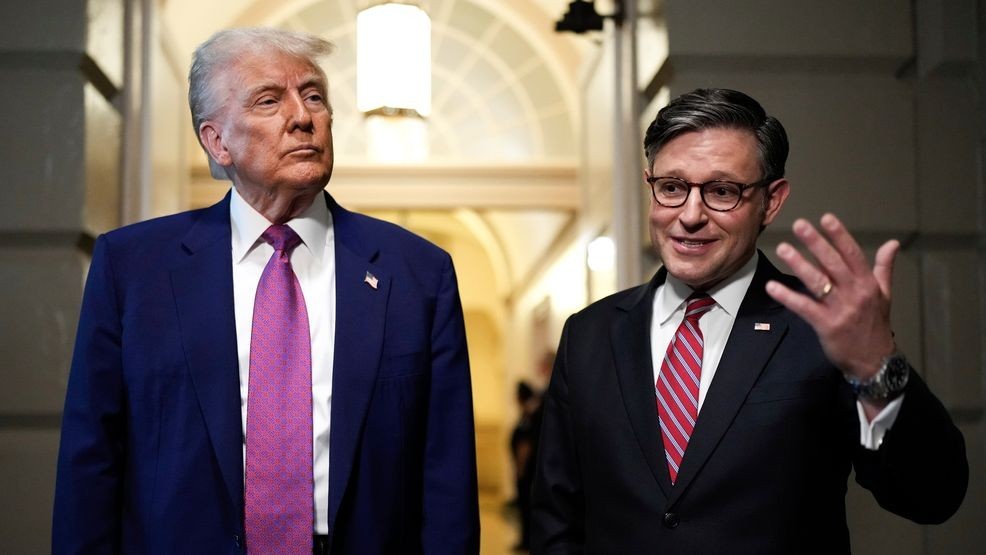COLUMBUS, Ohio (WSYX) — A federal budget bill, referred to as the “One Big, Beautiful Bill” by President Donald Trump, has passed the House of Representatives and is now headed to the Senate.
The legislation could have significant implications for Medicaid coverage in Ohio, a state that expanded Medicaid to include low-income residents. Approximately 750,000 Ohioans may be at risk if the bill becomes law.
“The budget that’s being proposed is a bit scary for social service organizations,” Jen Kuhn, senior associate director of advancement at Kaleidoscope Youth Center in Columbus, said.
The bill, shepherded by Speaker Mike Johnson, narrowly passed the House with a 215-214 vote. Notably, two Republicans, Reps. Thomas Massie of Kentucky and Warren Davidson of Ohio joined all Democrats in opposing it. The House GOP’s plan proposes cutting federal support for Medicaid by nearly $700 billion over the next decade, according to the Congressional Budget Office.
Ohio officials have indicated that if federal funding decreases, they may be forced to reduce coverage for the expansion group.
The bill would extend Trump’s 2017 tax cuts and allocate billions in new spending for immigration enforcement and the Pentagon. However, the Congressional Budget Office estimates that 13.7 million people could lose health coverage as a result.
LGBTQ+ individuals, particularly those living with HIV, people of color, and low-income families, are expected to be among the hardest hit. A manager’s amendment added just hours before the vote includes provisions targeting transgender Americans.
One provision strips all Medicaid and CHIP funding for gender-affirming care, including puberty blockers, hormone therapy, and surgeries, for trans people of any age. Another provision bans coverage for these services under the Affordable Care Act by excluding them from the definition of “essential health benefits.”
White House Press Secretary Karoline Leavitt directly addressed the concerns towards cuts to those benefits for LGBTQ+ people, saying, “[The Trump] administration and American people’s tax dollars are not funding any institution that includes hospital systems that are funding the chemical castration and mutilation of children. We are not going to tolerate taxpayer dollars going towards such efforts.”
Some opponents argue LGBTQ+ people are overrepresented in nearly every program the bill cuts.
“Why would anyone to actively harm another human being by cutting off their medical support?” Kuhn said. “The budget has things that actively attacks the LGBTQ+ community, that attacks things like DEI, just things that have nothing to do with finances and budget.”
Trump’s “One Big, Beautiful Bill” comes just after the Columbus City Council recently approved $265,000 towards Kaleidoscope Youth Center.
“At a time where state and federal policy is actively undermining the very existence of our LGBTQIA+ friends, neighbors, and loved ones, I firmly believe that when state and federal policy fails, our cities must lead,” Melissa Green said in council on May 12th.
But none of the City Council’s money, Kuhn said, will go towards clinical or behavioral services.
“There’s always a threat of funding loss, which is why we as an organization are trying to be more strategic about where those funds come from and kind of looking towards community support.”
Data from the Williams Institute at UCLA School of Law highlights that LGBTQ+ adults are nearly twice as likely as non-LGBTQ+ adults to rely on Medicaid as their primary source of insurance. Approximately 13 percent of LGBTQ+ adults, or 1.8 million people, are covered by Medicaid, including 180,000 transgender adults.
Rhea Debussy, Ph.D., the director of External Affairs at Equitas Health, commented on the potential impact of the bill.
“This morning’s vote in the US House of Representatives authorizes nearly $800 billion in cuts to Medicaid over the next decade. The Ohio Statehouse has proposed shrinking Medicaid eligibility if there is a change to the Federal Medical Assistance Percentage (FMAP). With 3.2 million Ohioans – including 1.3 million children – enrolled in Medicaid, a final vote in the US Senate could have devastating impacts on access to care for lower-income families across our state.”
Nick Saltsman, PharmD, Chief Pharmacy Officer at Equitas Health, warned of the consequences of deep Medicaid cuts.
“Deep cuts to Medicaid could result in an influx of patients – particularly those with chronic conditions like high-blood pressure, diabetes, and more – to emergency rooms across the state, which may bottle-neck hospital services for everyone,” he said. “Rather than straining hospital networks, legislators should focus on funding preventive healthcare, which results in lower costs to taxpayers, better patient outcomes, and lives saved.”
Debussy further addressed the issue of gender-affirming care, noting, “In the midnight hour, House Republicans added a ‘manager’s amendment’ that would ban gender-affirming healthcare coverage for all Medicaid enrollees, including children and adults. Equitas Health continues to work on this important policy issue, which could impact care for approximately 152,000 transgender people across the country. We strongly encourage people to communicate their concerns to members in the US Senate.”
As this bill now hits the Senate floor, opponents like Kaleidoscope urge lawmakers to reconsider, arguing that if federal funding decreases, all Ohioans, not just LGBTQ+ people, may not have the coverage they need.
If all of the chamber’s 45 Democrats and two Independents vote against the “One Big, Beautiful Bill”, four Republicans would need to vote against it to defeat it.
Bernie Moreno is expected to vote for it. Jon Husted wrote on Instagram before it was approved by the House, “The Big Beautiful Bill is a necessity because it cuts four trillion in taxes that otherwise would go up on the American poeple and small businesses.”


